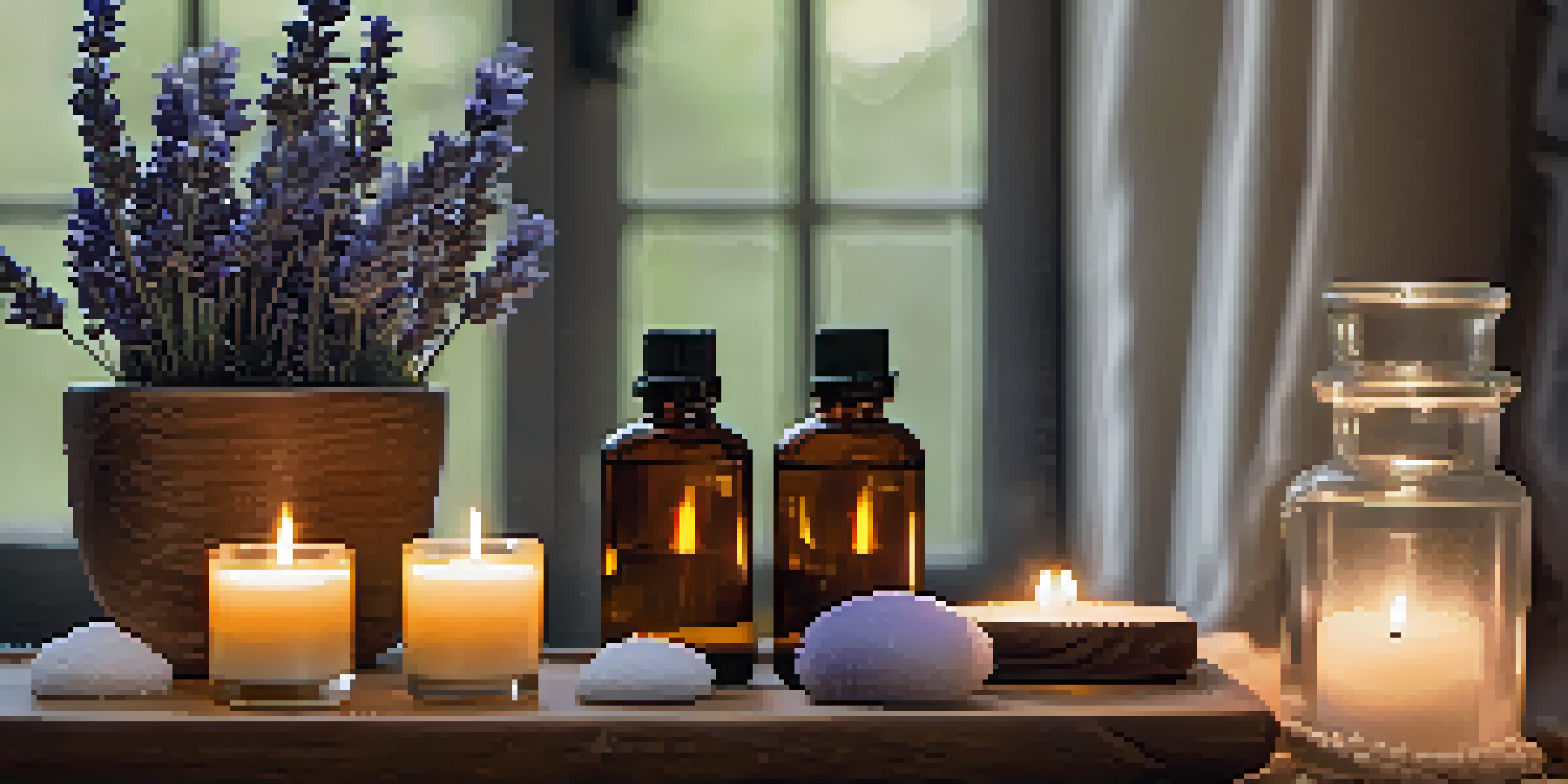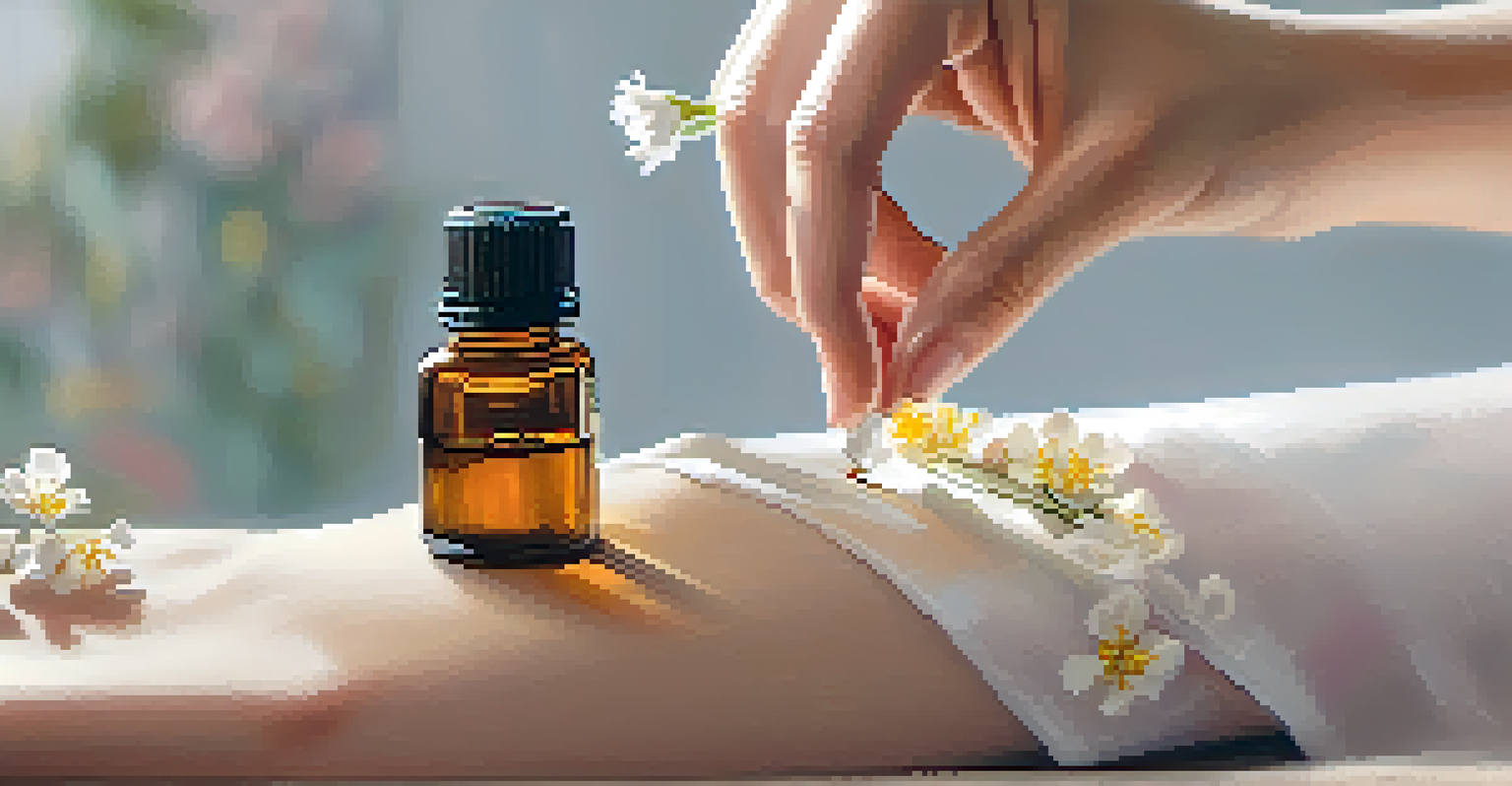Exploring Self-Care through Aromatherapy Techniques

Understanding Aromatherapy and Its Benefits
Aromatherapy is a holistic healing practice that uses essential oils to enhance physical and emotional well-being. These oils, derived from plants, can help improve mood, reduce stress, and promote relaxation. When inhaled or applied topically, they interact with the body’s chemistry, providing various health benefits.
The use of essential oils can be a wonderful way to enhance your emotional and physical well-being.
One of the key advantages of aromatherapy is its versatility. Whether you’re dealing with anxiety, insomnia, or even muscle pain, there’s likely an essential oil that can help. For example, lavender is well-known for its calming properties, while peppermint can invigorate and energize your spirit.
Integrating aromatherapy into your self-care routine is not only beneficial but also enjoyable. The delightful scents can transform an ordinary day into something special, helping you carve out moments of peace amidst life’s chaos.
Choosing the Right Essential Oils for You
Selecting essential oils can be overwhelming, given the vast array available. Start by identifying what you want to achieve with aromatherapy—whether it’s relaxation, focus, or relief from headaches. This clarity will help guide your choices.

For relaxation and stress relief, consider oils like chamomile or ylang-ylang. If you’re looking to boost your energy or concentration, citrus oils like lemon or orange might be your best bet. Remember, your personal preferences play a crucial role in the effectiveness of these scents.
Aromatherapy Enhances Well-Being
Aromatherapy uses essential oils to improve both physical and emotional health, helping to reduce stress and promote relaxation.
Experimenting with different oils can be an enlightening experience. You might find that a particular scent resonates with you more deeply, evoking memories or feelings that enhance your self-care journey.
Methods of Using Essential Oils in Self-Care
There are several ways to incorporate essential oils into your self-care practices. One popular method is through diffusion, where oils are dispersed into the air, filling your space with pleasant aromas. This can create a calming environment, perfect for unwinding after a long day.
Aromatherapy is a journey of the senses, a way to connect with oneself and promote healing.
Another effective approach is topical application, where diluted essential oils are applied directly to the skin. Always remember to dilute oils with a carrier oil, like coconut or jojoba oil, to prevent irritation. This method can be particularly helpful for localized issues, such as muscle soreness.
Lastly, consider incorporating essential oils into your bath routine. Adding a few drops of your favorite oil to warm bathwater can create a spa-like experience at home, allowing you to soak away stress and tension.
Creating a Relaxing Atmosphere with Aromatherapy
The environment you create plays a significant role in the effectiveness of aromatherapy. Setting the mood with soft lighting, soothing music, and comfortable seating can enhance your experience. When these elements come together, they create a sanctuary for relaxation and self-care.
Using a diffuser can help fill your space with your chosen essential oils, making it an integral part of your self-care ritual. You might also consider lighting candles infused with essential oils or using incense to create a warm, inviting atmosphere.
Choosing Essential Oils Wisely
Selecting the right essential oils based on your goals, such as relaxation or energy, is crucial for maximizing their benefits.
Don’t forget to declutter your space. A tidy area can help you feel more at ease and focused, allowing you to fully embrace the calming effects of aromatherapy.
Incorporating Aromatherapy into Daily Routines
Aromatherapy doesn’t have to be reserved for special occasions; it can easily be woven into your daily routine. Start your morning with an invigorating citrus scent to energize your day, or use a calming oil during your evening wind-down. This simple practice can make a big difference.
Consider keeping a personal roll-on blend in your bag for those stressful moments throughout the day. A quick inhale of your favorite calming oil can help center you and alleviate anxiety. It’s a discreet way to prioritize your well-being, even on the busiest days.
Incorporating aromatherapy into your self-care doesn’t require a lot of time or effort. Small, intentional practices can accumulate, leading to significant improvements in your overall mood and stress levels.
Understanding Safety and Best Practices
While aromatherapy is generally safe, it’s essential to follow best practices to avoid any adverse reactions. Always perform a patch test when trying a new essential oil on your skin, and consult a healthcare professional if you have existing health conditions or are pregnant.
Be cautious with essential oils around pets, as some oils can be toxic to animals. It’s vital to research which oils are safe and to use them in moderation. Creating a safe environment ensures that your self-care practices are beneficial for everyone in your home.
Safety and Best Practices Matter
Following safety guidelines and best practices ensures a beneficial aromatherapy experience while avoiding potential adverse reactions.
Lastly, remember that essential oils are potent. A little goes a long way! Overusing oils can lead to sensitization or diminishing effects, so moderation is key for a balanced aromatherapy experience.
The Transformative Power of Aromatherapy in Self-Care
Aromatherapy can be a transformative addition to your self-care toolkit. By embracing the power of scent, you open up new avenues for relaxation and emotional healing. It allows you to take a proactive approach to your mental health and overall well-being.
Regularly engaging in self-care practices that include aromatherapy can lead to lasting positive changes in your mood and stress levels. Over time, you may find yourself more resilient in the face of life's challenges, equipped with effective tools to manage stress.

So, why not give it a try? Dabble in different essential oils, explore various methods of use, and discover how aromatherapy can enhance your self-care journey. Your mind, body, and spirit will thank you!